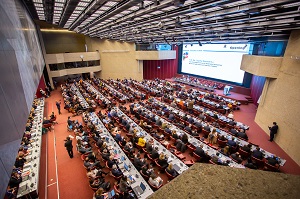
How can we turn intentions into action? At the 2019 Regional Forum, 850 key stakeholders demonstrated their readiness to act for the Sustainable Development Goals (SDGs) – not with lip service but concrete solutions. Gathering in Geneva on 21-22 March 2019, change makers from governments of 50 nations, international organizations, civil society, academia and the private sector engaged in intense discussions to move ahead with the ambitious 2030 Agenda on Sustainable Development.
UN Deputy Secretary-General Amina J. Mohammed, who has made it a priority to be present at all five Regional Forums, emphasized that “the Regional Forums are critical tools to maintain the ambition, review progress and exchange practices to implement the 2030 Agenda for Sustainable Development.” Making reference to school children marching for a healthy planet, she made a strong appeal to all participants that “the power to make that happen is not in their hands. It is in ours. Therein lies our duty to them.”
Albania’s Minister of Health and Social Protection, Ms. Ogerta Manastirliu, chaired this year’s Regional Forum. She emphasized that “achieving the SDGs should be considered as an integrated process, rather than working in an isolated sectorial approach.” Stressing the importance of mainstreaming gender, she stated: “We need strong women everywhere – not only on this podium. We can’t deliver on the seventeen Sustainable Development Goals if we don’t give primary attention to Goal number 5. Albania’s government cabinet has more women than men.”
Close alignment with High-level Political Forum (HLPF)
During the High-level Policy Segment of the Regional Forum, country representatives discussed how Voluntary National Reviews (VNRs) can serve as drivers of SDG implementation. The 2030 Agenda encourages member States to review their national experiences in implementing the SDGs, including successes, challenges and lessons learned. 2019 marks the first four year, complete cycle of the global SDG review process. 48 UNECE member states have conducted Voluntary National Reviews during this first cycle.
Closely aligned with the issues addressed at the High-level Political Forum (HLPF), the peer learning round tables focused on the implementation of the following five SDGs under in-depth review at the 2019 HLPF: SDG 4 (quality education), SDG 8 (decent work and economic growth), SDG 10 (reduced inequalities), SDG 13 (climate action) and SDG 16 (peace, justice and strong institutions).
Country representatives and other stakeholders shared concrete case studies from their national experience, proposed solutions to identified problems and discussed how best practices can be adopted by peers.
Participants also had the opportunity to engage in dialogues on pressing questions: How can we use technology, digitalization and artificial intelligence to accelerate SDG progress? How can we make better use of data and statistics to measure progress in SDGs?
Alongside the formal agenda, several pre-meetings channelled and coordinated the inputs of civil society, youth and volunteers to the Regional Forum. Eighteen side events offered further space for interactive discussions on current challenges, including how to ensure equal pay for work of equal value, how to harmonise economic growth and environmental sustainability, and how to foster labour inclusion of persons with disabilities.
Connecting the dots: strengthening cooperation
On the Forum’s second day, the keynote speaker Ms. Eeva Furman, Director of the Environmental Policy Centre at the Finnish Environment Institute SYKE, made a strong call for improved cooperation between sustainability scientists and policy makers. She emphasised that not a single country has achieved high levels of well-being in an ecologically sustainable way. As a co-author of the Global Sustainable Development Report 2019, Ms. Furman highlighted the report’s key findings including the identification of six areas for systematic transformation.
Michael Møller, Director-General of the United Nations Office at Geneva, emphasized: “The Forum has once again demonstrated the vital role that regional actors play in this necessary shift of gear. The scope of our ambition may be global, but the real action of implementation happens on the ground, in national, regional, and local contexts.”
“We need to respond to the challenges by creating broad spaces for policy discussion and exchange of experiences that are a good match for the features of the 2030 Agenda. Spaces that encourage breaking down sectoral barriers, stimulate innovative responses and draw in all the stakeholders across the region. This has always been the ambition of the Regional Forum” stressed UNECE Executive Secretary Olga Algayerova at the closing.
A fast-growing platform
Taking place for the third time, the Regional Forum is a fast-growing platform for meaningful exchange: the number of participants but also of pre-meetings and side events is unprecedented. The preparation of the Forum had involved colleagues across the regional UN system and exemplifies successful regional cooperation between a wide range of UN agencies.
Accelerating SDG progress in countries and the region
The Regional Forum feeds both into national and global processes. Discussions from round tables foster mutual learning and help countries accelerate national progress in implementing the 2030 Agenda. The Chair’s summary of the Regional Forum will provide the region’s official input for the High-level Political Forum (HLPF).
For further information please visit: https://www.unece.org/rfsd2019.html

